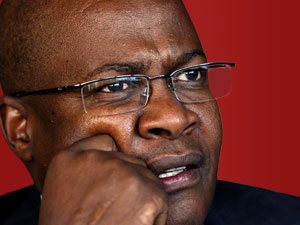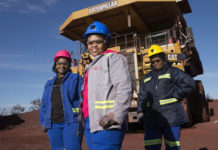
[miningmx.com] – BRIAN Molefe, CEO of Transnet, said in an interview yesterday that the transport utility’s interest in building its own 20 million tonnes/year (mtpa) coal export terminal in Richards Bay was not just a ruse.
“We would have been prepared to build it if the mining companies weren’t prepared to come to the party,” he said. If constructed, Transnet’s terminal would have competed with Richards Bay Coal Terminal (RBCT) which has plans to expand.
By way of reminder, Transnet’s terminal was to be for the use of black-owned emerging coal exporting companies who, Molefe feels, don’t get a proper share of the export entitlement owned by RBCT’s shareholders which include BHP Billiton, Anglo American and Glencore.
The threat posed by Transnet’s new terminal to RBCT’s shareholders is that it would have absorbed much of the additional rail capacity on the Richards Bay coal line that Transnet is building, and would have frustrated RBCT’s own ambitions of taking its capacity to 110mtpa from the current 91mtpa.
It doesn’t matter that the coal line will only transport 73mtpa in RBCT’s current financial year (which ends December 31). The expectation in government circles is that South Africa must aggressively increase its coal production which will be from new black industrialists.
Molefe had asked RBCT shareholders to make more of their export entitlement available to black companies and it seems many at first refused having felt they had already done a lot of BEE through the government-administered Quattro system.
The Quattro system supplies 4mtpa of coal export entitlement and the word on the street is that this isn’t always filled. In fact, some black companies buy coal in because they haven’t any operating mines, market sources say.
Molefe has it the other way round. He cites evidence that black-owned coal exporters have to sell their coal to the established players at a premium because they have more coal than export entitlement.
The debate was carried over into the rail tariff negotiations Transnet had been holding with coal exporters and it seems as if Molefe has won out.
BHP Billiton, for instance, agreed in its R24bn coal take-or-pay rail deal earlier this month with Transnet to make a portion of the extra 800,000 tonnes/year capacity it will get on the coal line available to black-owned companies.
This debate between Transnet and BHP became so heated that one meeting almost came to blows, said Molefe last year.
At the time, Molefe accused BHP of not supporting empowerment – an accusation that brought the normally discreet BHP out fighting. It denied Molefe’s accusation and said it had long supported empowerment in the country.
Now the sides had “kissed and made up’, said Molefe, the Transnet terminal had been iced. “It’s not even in our seven year plan,’ he said.
Molefe is very likeable: blunt, a pragmatist one suspects, and a warm sense of humour. But using taxpayers money to wage wars against the private sector seems a tad wreckless; that’s if the terminal was really only a bargaining chip.
And it may not be.
The way Nosipho Damasane, CEO of RBCT describes it, the port of Richards Bay has a capacity that can provide support to both terminals.
“It’s perfectly logical for Transnet to build its own terminal and co-operate with us at the same time because Richards Bay as a port has a capacity of 140mtpa,’ she said in a recent interview.
Ali Motala, GM of Transnet’s Waterberg business, said during a site visit to Exxaro Resources’ Grootegeluk earlier this year that Transnet’s terminal plans were still very much alive. “We have not abandoned the terminal,’ said Motala. “We are very committed to the development.’
In fact, Motala believed that future coal supply from southern Africa could total 200mtpa – all of which could be exported through South Africa. Of this, about 60mtpa would be from Botswana, 40mtpa from the Waterberg, and the balance from Mpumalanga province, he said.
Transnet can be perplexing. It talks and acts (and performs) like a very successful private company, and it seems to have the technical skills depth that Eskom, another state-owned utility, has long lost.
But, like Eskom, Transnet is also monopoly with a heart that pumps to the beat of government industrial policy rather than commerce. One suspects Molefe was being truthful: the terminal wasn’t just a ruse.











